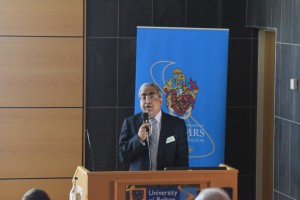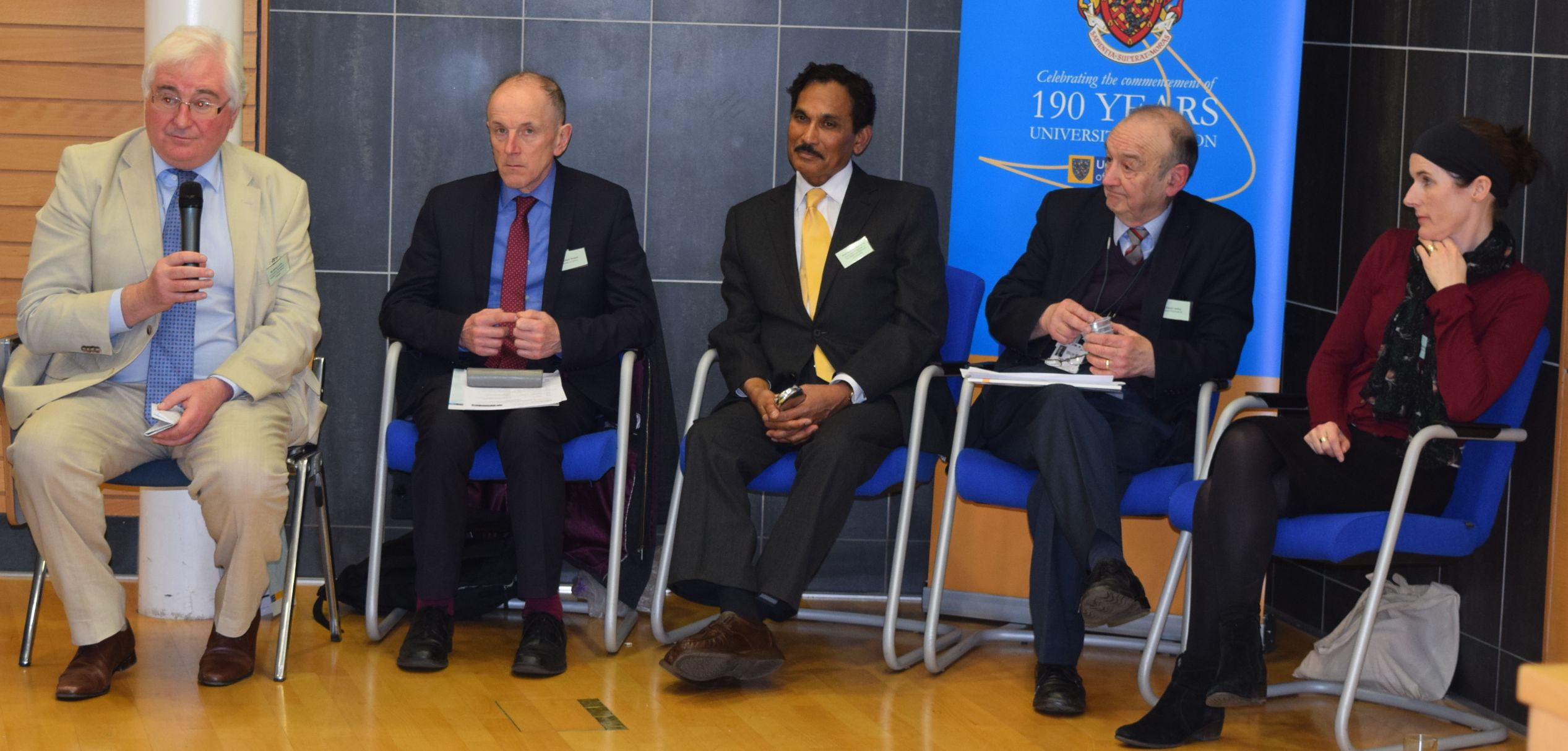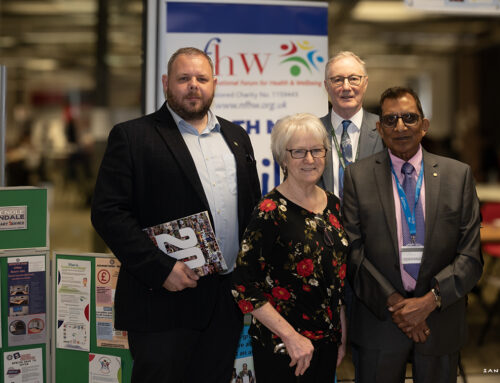The National Forum for Health & Wellbeing, in partnership with the Centre for Research in Health & Wellbeing of the University of Bolton held its second successful conference on 25th March 2015. This year’s conference with the theme “Sustaining Health and Wellbeing in Later Life” was attended by nearly 100 delegates from the public, University, health and social sectors.
Professor Romesh Gupta, Director of the Centre for Research in Health & Wellbeing welcomed the delegates and the speakers. Jane Howarth, Dean and Head of the School of Health and Human Sciences, University of Bolton chaired the inaugural session which was addressed by Professor John Ashton, President of the Faculty of Public Health.
Professor John Ashton noted that, ‘as people live longer it is important to build public confidence in community services.’ In discussing different types of dementia he said,‘ about 30% of elderly people are depressed due to loneliness and ill health.’
He stressed that prevention was key to growing older healthily with particular emphasis on falls, glaucoma and vascular disease.
Professor Ashton stressed the fact thatpeople should think about and plan for their life in later years. He suggested people should be encouraged to share their views with relatives, next of kin and that healthcare providers should work in tandem to provide healthcare in the community rather than in hospitals.
He said that although people have views about how they would like to be treated (or not treated) at the end of their lifetime, most do not plan nor prepare advance directives about their wishes. He suggested that addressing this question, making appropriate provision for such an eventuality and building confidence can then give elderly people the choice of being at home when they die. He further said that if we could treat people in their homes, hundreds of thousands of hospital beds could be freed.
The next speaker of the session was Professor Jerome Carson from the University of Bolton. Professor Carson discussed factors that affect happiness and delegates were requested to participate in a very interesting quiz about happiness.
Professor Carson suggested that resilience was the key to happiness, and personality is the secret to happiness. He presented evidence which showed that amongst different age groups, elderly considered themselves happier than younger.
 After a brief coffee break, the second session was chaired by Dr Wirin Bhatiani, Chairman of the Bolton CCG.
After a brief coffee break, the second session was chaired by Dr Wirin Bhatiani, Chairman of the Bolton CCG.
Mr Khushal Kumar, Homeopath and Reiki Grand Master from Consultant Holistic Living, Preston spoke on the topic “Maintaining Dignity through an Holistic Approach to Health”. He said that a holistic approach could be physical, emotional and spiritual. He concluded by saying dignity is often confused for respect and that while growing is mandatory, growing up is optional.
A PDF copy of his presentation can be downloaded here. (548kb)
This talk was followed by one from Dr Amit Arora who is Consultant Physician and Clinical Lead for Older Adults at the University Hospital of North Midlands.
Dr Arora spoke on the ” Use of Assistive Technology in Sustaining Wellness”. He said that a variety of technology is now available ranging from tele-health and tele-care to tele-diagnostics, all of which can be utilised to look after the elderly and can be tailored to the needs of individuals and used either at homes or care homes.
He further stated that packages to assist people following falls, learning difficulties and dementia are available. Dr Arora finished with this thought “Add life to years not years to life.”
He listed his key messages as follows:
- Technology is available and is rapidly evolving.
- It is gradually becoming less expensive and it’s easily available.
- Indigenous methods/modifications could work for some population groups.
- Need to identify which patient groups need it/potentially will benefit from it and will be happy to have it.
- Commercial interests could become a driver and we need to be careful here.
- Evidence and data gathering is important as will /could inform national policy.
- Finally it is not a ‘one size fits all’ solution.
- This should be seen as one of the strategies for improving care of older people.
Later, before breaking for lunch, the delegates and panel discussed accessibility and the cost of these services as well as debating whether the holistic therapies should be available on the NHS
Professor Romesh Gupta and Professor Jerome Carson chaired the third post lunch session. It included talks from Mr Simon Kelly, Consultant Ophthalmic Surgeon, Royal Bolton Hospital and Professor Kailash Mohanty, Consultant Physician in GU Medicine.
Mr Kelly, speaking about “Sustaining Good Vision”, said that macular degeneration, the commonest cause of visual impairment and short sightedness, worsens in later life. He said that prevention is the key to maintaining good eyesight. Dr Kelly discussed areas that can cause injury and harm to eyes and enumerated common causes of which cause sight problems such as smoking, laser pointers, poppers, sunshine and mascara. He also highlighted the role of green vegetables and other food ingredients in maintaining good eyesight.
Professor Kailash Mohanty talking about “Sexual Health Issues” highlighted the fact that there are nearly 1 million HIV test annually and that approximately 450,000 new cases identified each year.
Professor Mohanti discussed genes mapping and also explained work on DNA sequencing.
The final session of the day was chaired by Mr Simon Kelly and Dr Bob Snape. It included interesting talks from Catherine Coulthard, Director of Prism Arts, Cumbria on “The Role of the Arts in Health and Wellbeing” as well as from Professor David Jolly, Consultant Psychiatrist, Manchester on “When the chips are down”.
Catherine Coulthard discussed her experiences working with people with dementia, elderly and stroke patients. She spoke passionately about how art and drama can assist in engaging and sometimes unlocking the potentials from those individuals and how it benefits them by making their life lively and meaningful.
Professor Jolly discused the “Wellbeing Wheel” by engaging the audience in a sort of question – answer dialogue. His talk was spontaneous, witty and full of laughter.
The final session was followed by a panel discussion which was hosted by Professor Romesh Gupta.
Participants agreed that the benefits of the art sessions were valuable and discussed costs of and how these could be made accessible on the NHS. It was suggested that a combination of physical, mental, social and spiritual work is required to support the elderly in later life and the consensus seems to be that people high on spirituality and in a faith system cope better with mental illness.
The day ended with a vote of thanks from Professor Romesh Gupta.


















Leave A Comment